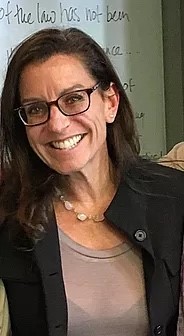New Clark Ombudsperson available to help staff, faculty with tough workplace issues
While conflict is a natural part of any workplace, not all employees know how to handle it. They may not trust their own feelings or perceptions and might not feel ready to take their problem to a University office like Human Resources. That’s where Israela Brill-Cass comes in.

Brill-Cass is Clark’s first ombudsperson — an independent, confidential, neutral resource for employees dealing with difficult situations.
“The independence piece is so important,” she explains, noting that as an independent contractor, she is not beholden to any Clark office or person. Brill-Cass will provide President David Fithian with a monthly report showing how many employees she has spoken with and the number of departments represented, and an overview of the general reasons for the visits, with no identifying information. Periodically, she will check in with Fithian to share any concerning trends — situations where multiple people raise the same concern within the same department — if they exist. The ombud’s consultation with an employee is always confidential and will go no further unless the employee asks Brill-Cass to bring their concerns to the president or to a campus department.
What can Clark employees expect from her?
Brill-Cass describes an ombudsperson’s job as one of triage. Many people who make appointments with her aren’t sure if she’s the one who can help them.
“I’m not a policymaker or decision-maker,” Brill-Cass continues, “but I will listen, and we can talk about what’s going on. I will validate a person’s experiences and give advice — if they want it.” That advice might be about what options the employee has, whether a specific campus office can help, or how to strategically approach a situation. She also will provide guidance with negotiations or help craft an email.
Most conflict situations on a university campus involve everyday human interactions, which can result in an employee not feeling validated or recognized, concerns over lack of transparency, and lack of consistency between the expectations for an employee and that person’s job description. Since human nature is to avoid conflict, Brill-Cass says, we often don’t deal with uncomfortable situations in the early stages, and they can worsen, particularly if there is a power differential.
Brill-Cass stresses that she is not a mandated reporter — unless she believes the employee is a threat to themselves or others — and she does not tell people what action to take. She will discuss the pros and cons of various options, but adds, “I’ll never steer people in either direction. It’s important not to retraumatize anyone and to empower them to decide what, if anything, they want to do about their situation.”
Along with helping individual employees, she can serve as a buffer or liaison between Clark administrators and groups of staff members who wish to remain anonymous while sharing concerns they feel are essential to share.
Visits with Brill-Cass are all virtual, although she will be open to meeting with employees in person — “six feet apart and masked” — if future conditions allow.
Brill-Cass has previously facilitated sessions in diversity and inclusion, implicit bias, and race and gender in negotiations, and has worked with employees of color who are facing stressful workplace situations. “My first step is to validate,” she says, noting that people of color, specifically women, often have internalized messages that their perspectives are not valid and that they should be grateful to have a job. “That’s a horribly disempowering thing to go through.”
In such cases, she will have a conversation with the employee about how they might want to approach the issue with their supervisor and explore what options might lead to a successful resolution. “Let’s help you find the words you need to have that conversation,” she says. In her work, she calls that process “standing up for yourself without knocking others down.”
Brill-Cass, who holds a bachelor’s degree from Brandeis University and a law degree from Suffolk University, has 25 years of experience as an attorney, mediator, facilitator, trainer, and consultant. She currently provides ombuds services at Wesleyan University, and has consulted and led workshops for institutions that include Harvard’s T.H. Chan School of Public Health, Bryant University, Tufts University, the Rhode Island School of Design, and the Commonwealth of Massachusetts.
In 2015, she founded Fixerrr, LLC. Those three r’s stand for rethink, respond, and resolve.
“I became a lawyer in 1993, was trained as a mediator in 1998 — and a lightbulb went off. I didn’t become a lawyer to be someone’s blunt instrument; I went to law school to empower people to get themselves out of conflict. They are the experts in their lives.”
The “rethink, respond, resolve” mantra comes from her background in alternative dispute resolution, which includes arbitration, mediation, and negotiation. “It means to rethink situations you’re in and not let them look like a win-lose problem,” she says. “There’s no such thing. Even the most intractable conflict can be resolved with the right ingredients — it just takes time.”
She encourages people in conflict to rethink their situations and respond in productive ways. “Understand that our words make a difference, and our behaviors are impacted by who we are. Rethink what you’re bringing to the conflict, then resolve to do better.”
“Individuals are unpredictable,” Brill-Cass says, “but part of managing conflict is taking responsibility for your part, and being willing to address that.”
A virtual open house will be held at 4 p.m. on Wednesday, Nov. 11, for faculty and staff to get to know Brill-Cass and hear more about the services she will provide. She will offer virtual ombud appointments to Clark employees on alternate Thursdays starting Nov. 12, but can be available at other times via email, if necessary.


